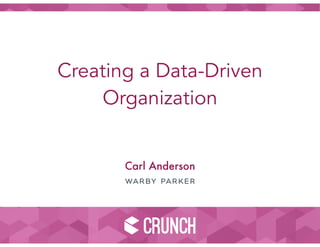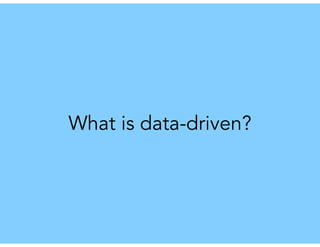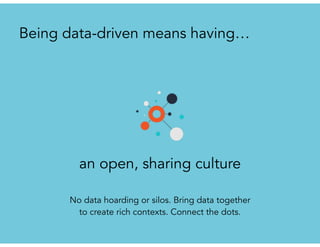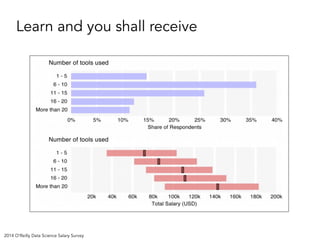Creating a Data-Driven Organization, Crunchconf, October 2015
- 1. Creating a Data-Driven Organization Carl Anderson
- 4. 5%more productive Controlling for other factors, data-driven orgs are Brynjolfsson, et al 2011. Strength in numbers: how does data-driven decisonmaking affect firm performance? Social Science Research Network http://bit.ly/1dg896Y
- 5. $13/ $1 invested Analytics pays back Nucleus Research. 2014. http://bit.ly/XQFDbv
- 7. Having lots of reports does not make you data-driven.
- 8. Having lots of dashboards does not make you data-driven.
- 9. Having lots of alerts does not make you data-driven.
- 10. Figure from http://www.bwfhosting.com/we-got- your-back/
- 11. Data-driven: you must have analytics Not necessarily data-driven ! Reporting Analysis Descriptive Prescriptive What? Why? Backward-looking Forward-looking Raise questions Answer questions Data → Information Data + Information → insights Reports, dashboards, alerts Findings, Recommendation No context story telling
- 12. Figure from https://www.sas.com/news/sascom/analytics_levels.pdf Levels of Analytics
- 13. Analytics Value Chain Figure from http://adobe.ly/1HLJKGk
- 14. “Analytics is about impact…In our company [Zynga], if you have brilliant insight and you did great research and no one changes, you get zero credit.” Ken Rudin Facebook
- 15. Train analysts to be business savvy 2013 Strata+Hadoop talk: https://www.youtube.com/watch?v=RJFwsZwTBgg
- 16. Having a hadoop cluster does not make you data-driven.
- 18. Leverage data as a strategic asset.
- 19. Data-driven requires a data culture
- 20. Culture Testing Iterative, learning Open, sharing Self service Data leadership Broad data literacy Inquisitive, Questioning Goals first Data Driven Culture
- 21. a strong testing culture Being data-driven means having… Innovate through online and offline experimentation. Encourage hypothesis generation broadly across org.
- 22. “you get surprises more often, and surprises are a key source of innovation. You only get a surprise when you are trying something and the result is different than you expected, so the sooner you run the experiment, the sooner you are likely to find a surprise, and the surprise is the market speaking to you, telling you something you didn’t know.” Scott Cook Intuit Baer, D. 2013. Why Intuit founder Scott Cook want you to stop listening to your boss. Fast Company
- 23. Optimize for Right Thing
- 24. Iterate
- 26. an open, sharing culture Being data-driven means having… No data hoarding or silos. Bring data together to create rich contexts. Connect the dots.
- 35. 1/3 business leaders frequently make decisions with data that they cannot trust Business Analytics and Optimization for the Intelligent Enterprise. IBM. http://ibm.co/1LR2pCr Invest in data quality
- 36. a self service culture Being data-driven means having… Business units have necessary data access as well as within- team analytical skills to drive insights, actions, and impact.
- 37. Traits of great analysts • Numerate • Detail-oriented • Skeptical • Confident • Curious • Communicators • Data lovers • Business savvy Few, S. 2009. Now You See It. Analytics Press, Oakland has a good discussion of this topic, pp. 19–24.
- 38. Hiring not just as individuals but to complement team Nordstrom data lab (as of Strata 2013)
- 39. a broad data literacy Being data-driven means having… All decision-makers have appropriate skills to use and interpret data.
- 40. Analysts must sell, sell, sell their product
- 41. Figure from http://www.uglyresearch.com/UglyResearch_DataEasy_DecidingHard.pdf Tie actions to outcomes
- 42. a goals first approach. Being data-driven means having… Set out metrics before experiment. What does success mean? Have an analysis plan. Prevent gaming the system.
- 43. an objective, inquisitive culture Being data-driven means having… ‘“Do you have data to back that up?” should be a question that no one is afraid to ask and everyone is prepared to answer’—Julie Arsenault.
- 44. a visible, clearly-articulated strategy Being data-driven means having… Commonly understood vision. Suite of well-designed, accessible KPIs. All staff understand how their work ties back to these metrics.
- 45. strong data leadership Being data-driven means having… A head of data to evangelize data as strategic asset with budget, team, and influence to drive cultural change.
- 46. Which strategies have proved successful in promoting a data-driven culture in your organization? Strategy % of respondents Top-down guidance and / or mandates from execs 49 Promotion of data-sharing practices 48 Increased availability of training in data analytics 40 Communication of the benefits of data-driven decision-making 40 Recruitment of additional data analysts 17 2013. Fostering a data-driven culture. Economist Intelligence Unit. http://bit.ly/1MeGoN8
- 47. but bottom up too Change should not just be top-down Everyone in org has role and responsibility through “leveling up” their data skills, mutual mentoring, and embedding data into their processes.
- 48. 2014 O’Reilly Data Science Salary Survey Learn and you shall receive
- 49. blindly following data. Being data-driven doesn’t mean Augment decision makers with objective, trustworthy, and relevant data.
- 52. using data to effect impact and results Ultimately, data-driven means Push data through “analytics value chain” from collection, analysis, decisions, action, and finally to impact. Partway along chain doesn’t count.
- 53. Example actions • Analyst competency matrix • Raise bar for new analyst hires • Vision statement: data culture • Stats for managers class • Mentor / train analysts to improve skills such as stats, SQL • Mentoring staff in experimental design • Democratizing data access through BI tools • Push on ROI, tie back to strategic objectives
- 54. Don’t get complacent! “With the exception of, say, an Amazon, no global store chain was thought to have demonstrably keener data-driven insight into customer loyalty and behavior”
- 55. Tesco Today • Tesco stock rated as junk • Shedding 9000 jobs • Closing 43 stores • $9.6B loss for 2014 fiscal year ($33Bn debt) • Tried and failed to sell Dunhumby, their analytics gem • Warren Buffett: “I made a mistake on Tesco”
- 56. Data Organization Decision Making People Data Leadership Culture Analytics org: composition, skills, training Data quality, data management Embedded, federated analytics Testing mindset, fact-based, anti-HiPPO Chief Data Officer / Chief Analytics Officer Collaborative, inclusive, open, inquisitive Summary
- 57. Bake in data-driven culture early!
- 58. Available now 1. What is Data-Driven? 2. Data Quality 3. Data Collection 4. Analyst Org 5. Data Analysis 6. Metric Design 7. Story Telling 8. A/B Testing 9. Decision Making 10. Data-Driven Culture 11. Data-Driven C-suite 12. Privacy, Ethics 13. Conclusions Copyright © 2015 Carl Anderson














![“Analytics is about impact…In our company [Zynga],
if you have brilliant insight and you did great research
and no one changes, you get zero credit.”
Ken Rudin
Facebook](https://image.slidesharecdn.com/carlandersonddobudapest-151027022634-lva1-app6892/85/Creating-a-Data-Driven-Organization-Crunchconf-October-2015-14-320.jpg)












































